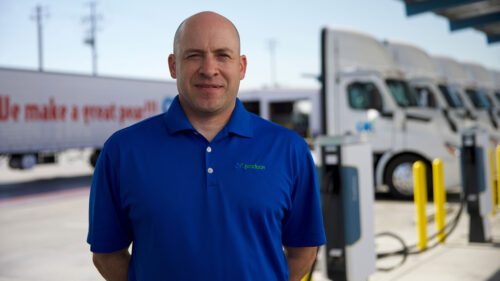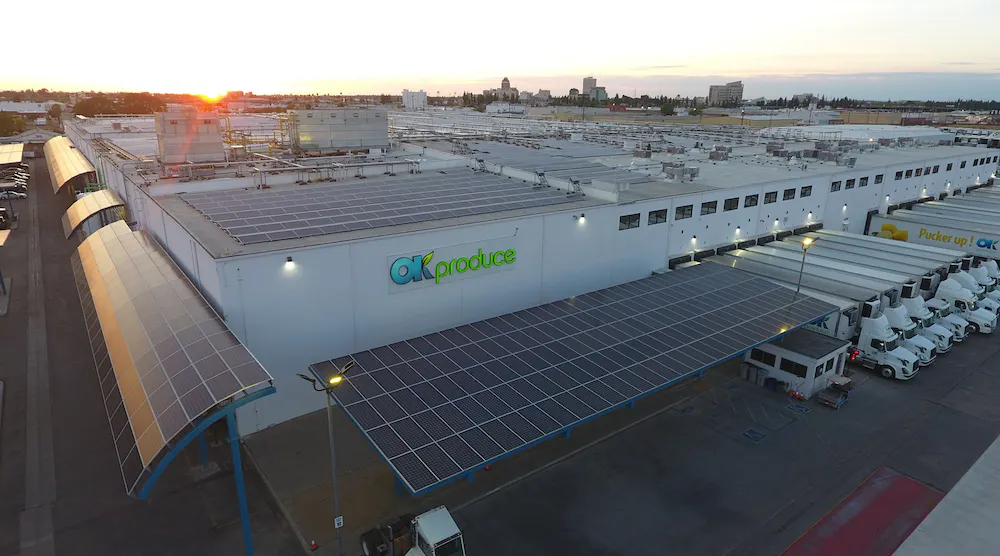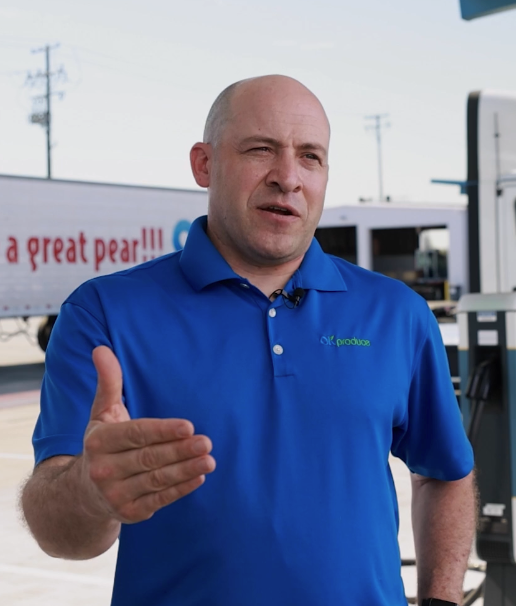
Produce Deliveries, Electrified
Meet Brady Matoian, CEO of OK Produce and Sustainability pioneer
Brady Matoian comes from a farming family. When his grandfather, Charlie, immigrated to the United States from Armenia in the early 1900s, he settled in California’s San Joaquin Valley and began farming. In the 1930s, he began delivering produce out of his flatbed truck. He eventually founded OK Produce in 1950 to deliver fruits and vegetables throughout the entire valley. In 1979, Matoian’s father took over the business, and in 2000, the younger Matoian joined the team. “Each generation has tried to make a mark,” he says. “I came in with a very different angle. I have been interested in and committed to environmentalism since I was in the fourth grade, and always wanted to make an impact.”
In 2001, Brady started a sustainability program and installed one of the biggest solar projects in the western states at that time, a 231 kilowatt (kW) solar system that has since expanded to 3.8 megawatts (MW), and that powers 90 percent of OK Produce’s facilities. This marked the start of a full-blown commitment to do business in the most Earth-friendly way possible.

One day in early 2001, as he was in the parking lot of the facility, the smell of diesel was overwhelming to him. “There was a serious cloud of emissions coming out of this little bunch of trucks,” he says. “It was an eye-opening moment for me.” Matoian made the connection that they had a delicious, nutritious product — fruits and vegetables — and were delivering it in trucks that polluted.
For the next 20 years, OK Produce tried everything possible to reduce pollution, including buying new trucks, adding side skirts to improve efficiency, transitioning to super single tires to boost mileage, and becoming a very early user of biodiesel. These did make positive impacts, but not to the scale Matoian desired. Starting in 2020, the company began to experiment with electric trucks. Today their fleet includes 10 electric trucks, three electric terminal tractors, and 12 electric cars. And an additional seven electric trucks are in the works. OK Produce also installed additional solar to cover the power needed for these new EVs to make them fully zero emissions.
“Being in a business where you can’t fail on deliveries — everyone wants to see a produce department that is fresh and full — means that investing in new technology is risky,” says Matoian, who took over operation of the family business with his brother in 2008. “But for me, being proud of how and what we do, and having our team be proud of how and what we do, has been worth that risk.”
And the company was surprised at how well the trucks have performed and how far they were able to travel. “Also, the drivers absolutely love them,” he adds. “It’s such a better experience than hearing all day long the roar of the pistons firing. Our team members are driving trucks now that purr like kittens and create far less pollution not only in the communities we service but also for our drivers and customers.”
OK Produce’s sustainability ambitions are growing by the day. Matoian’s dream is to eventually have a fully electric fleet, and his team agrees. “Now everyone’s thinking about what is possible rather than concentrating on the challenges. We understand that this is not easy, but progress is exciting, and we are proud to lead the way,” Matoian explains. “We are now setting our sights at much higher goals and new ways of doing business and that will mean 40, 50, 60 trucks. The idea is to lower our emissions as quickly as possible.”
In late 2023, OK Produce took part in NACFE and RMI’s Run on Less – Electric Depot, an event featuring 10 electric truck fleets operating in the United States, Canada, and Mexico. The event focuses on scaling electric trucks across a variety of market segments. “This event will help us share information on charging infrastructure, engagement with utilities, total cost of ownership management, truck performance, driver and technician training, charge management, and more to help the entire industry move to a cleaner freight future,” says Mike Roeth, NACFE’s executive director. “OK Produce plays a big part in moving the industry forward.”
“We are very excited to be participating in NACFE and RMI’s Run on Less – Electric DEPOT to share what we have learned to help others in their electrification journey,” says Matoian. “It’s so important for us to move fast as the collective impact on the environment from the trucking industry is significant. It will take teamwork throughout the industry to make positive change happen.”
Excerpted from RMI’s 2023 annual report. Dive into more stories there, at this link. For more on OK Produce’s EV journey visit Run on Less.
